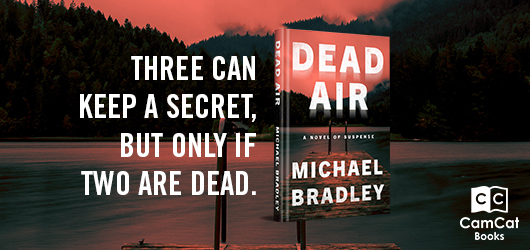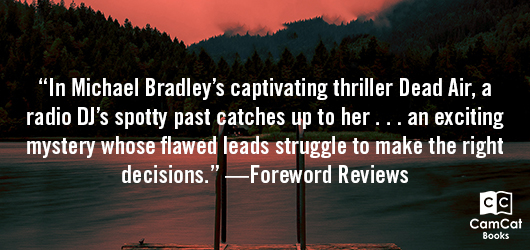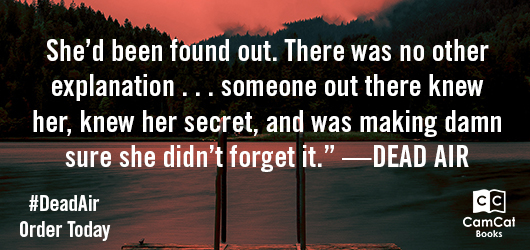Reviewer Interviews Michael Bradley, Author of Dead Air
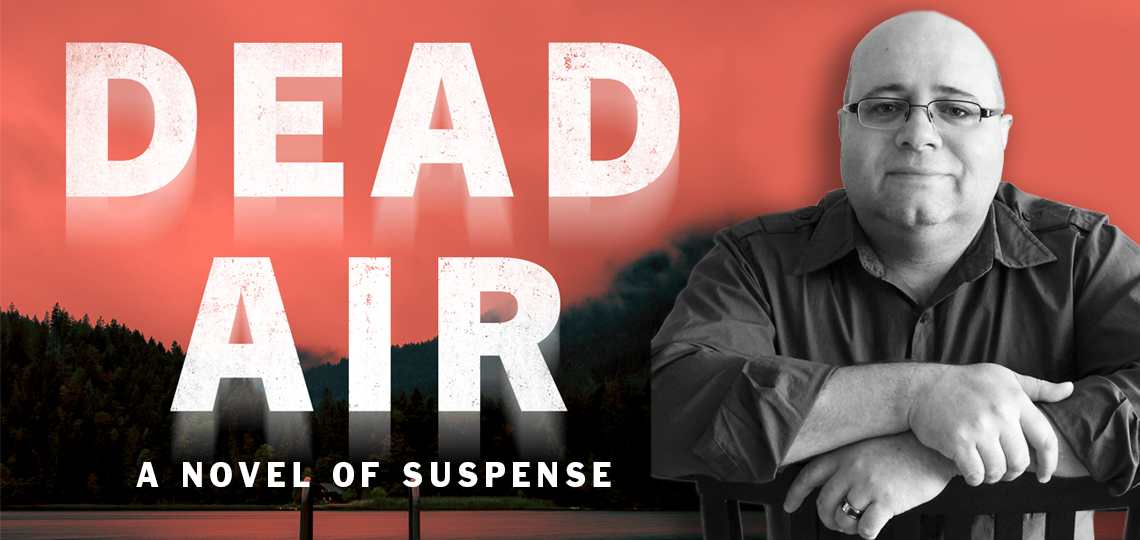
We have presidents Nixon and Clinton to thank for popularizing the maxim “it’s not the crime, it’s the cover-up” in their bumbling efforts not to tell the truth, the whole truth, and nothing but the truth about misdeeds. And while most of us don’t have Watergates and Monica Lewinskys in our past, we’d all be wise to acknowledge how tempting it is to avoid coming fully clean about parts of our own life story. History is haunting—if we don’t face the demons of our past head on, we’ll do just about anything to keep the truth from others.
Michael Bradley is well aware of these and other unflattering facts about human nature. The author of three suspenseful novels, including the recently released Dead Air, Michael likes nothing more than to study the quirks and habits of people from all walks of life. By paying such attention, he can enrich his work with details both mundane and extraordinary and readers feel that much closer to his characters.
In her review for the May/June issue of Foreword Reviews, Delia Stanley called Dead Air a “captivating thriller,” with protagonists that “harbor intense guilt about their pasts, which manifests in irresponsible and dangerous ways.” Sensing her enthusiasm, we connected Delia with Michael for the following conversation about the art and craft of creating suspense.
Delia, the stage is yours.
In Dead Air, protagonist Kaitlyn is a radio DJ, drawing from your own experience in the field. Kaitlyn’s isolated overnight shift immediately sets a mysterious mood, even as your other books involved radio, as well. Is there something about radio life that is inherently inspiring when it comes to the suspense genre?
Broadcasting can sometimes be a lonely career. If you work the evening or overnight shift, you are frequently alone in the studio, often with no one else in the building. It can get a bit creepy, to say the least. During the night shift, your only human contact usually is the disembodied voices that come over the telephone when people call in to make requests. Sometimes those calls can get a bit odd. Although I never experienced it, I’ve known a few radio DJs in my time who had trouble with fanatical fans. When you hear the same voice on the phone every night and see the same face at every live appearance, you start to wonder if you have a stalker.
I recall working the weekend overnight shift for about a year in a third-floor corner radio studio that had windows that looked out over the main street of a small city in New Jersey. There was something eerie about watching traffic lights change color along an empty boulevard. The lights would turn red, but there were no cars to stop. There were no people. All the storefronts were dark. Sometimes I’d find myself wondering if I’d locked the front door of the radio station.
Isolation, in general, is always a great start for any suspense story. The protagonist is alone with nowhere to turn for help. When you place that character in a career that is inherently isolating, such as late-night radio, you now have a great recipe for thrills and chills.
Were there skillsets picked up during your time as a DJ and in the IT world that have crossed over to your writing?
The best skillset that I picked up from radio is how to be a good listener. Or, perhaps the more accurate term would be an eavesdropper. I’m always listening to the world around me, particularly conversations. You never know when you might pick up a good bit of dialogue for a future book. There is one line in Dead Air that I originally overheard one evening in a small café near me. Some college students were huddled around a nearby table studying, and I overheard one of them say that she got an Oreo stuck in the charging port of her mobile phone. It was such an unusual thing to hear that I wrote it down, and it ended up in Dead Air.
Let me be clear, I’m not listening to be nosy. I listen to what is going on around me to pick different dialects, different ways that people talk, unusual phrasing that I can use in a future book, and even the sounds and atmosphere around me. It is all about bringing realism into my books.
In your acknowledgments, you say “The Shallows,” a childhood memory dreaded by Kaitlyn, is based on a small farm pond in New Jersey. The details around the quicksand-style mud of The Shallows is specific yet familiar, calling on youthful memories of neighborhood areas that were both fun and dangerous. Did you have childhood experiences at this Jersey pond, or similar places that helped add that realism and bring The Shallows to life?
The pond in question sits along the edge of a farm and can be seen from the northbound lane of the New Jersey interstate. It’s been in the family of an old high school friend for decades. I’ve been to the pond a few times when I was a teenager. I can’t recall ever swimming in the pond, but I might have gone ice skating on it once or twice. Anyone who has ever skated on a frozen pond knows that sense of foreboding that comes when you hear the ice crack. In reality, that pond was never quite as dangerous as I made The Shallows out to be.
For years as an adult, I’ve driven past that pond more times than I can count. Every time, I’ve looked at it and felt like it was calling me. There was a story in the pond that was dying to be told. Over time, that story formed and became Dead Air.
One of the aspects of Dead Air I enjoyed most was the first-person perspective of Kaitlyn’s stalker, which increases empathy towards them and also adds to the tension around their identity. How and why did you decide to make the only first-person perspective that of the “bad guy”?
I’ve never been much of a fan of writing in the first-person perspective of my characters. I tried it with my second novel but hated the results so much that I rewrote the entire thing in third person. I had a tendency to go too deep into my character’s head and found myself repeating things again and again.
When I finished the first draft of Dead Air, I felt as if the story was still lacking some key pieces. There were hints about Kaitlyn’s past that I wanted to reveal to the reader, but it seemed out of character to have her making the revelations. I decided to show the perspective of the “bad guy,” but doing this in third person would have given away too many details about the identity of my antagonist. The first-person perspective was the best way for me to accomplish what I wanted to do. It wasn’t easy to write, and I went through several rewrites before I was happy with the new perspective. Ultimately, I think it was the right decision, and it added a new depth to the story.
Kaitlyn, her stalker, and even the detective on the case, are all working through some major guilt issues and past trauma that affect their behavior, even blurring the lines between victim and perpetrator. How do you create balance between flaws and likability?
When I created Kaitlyn and Rodney, I knew that they were deeply scarred. Each had their own past tragedies that left them battered and broken. To make them likable, I had to ground them in reality. They had to care about the same day-to-day things that the reader does. For instance, there is a moment in the book when Rodney is half-listening to a phone conversation while looking out the window and thinking that he needs to mow his lawn. I think the mundane details about a character’s life often helps the reader to feel closer to them. Rodney reads and quotes philosophical and historical figures like Aristotle and Ulysses S. Grant. Kaitlyn’s guilty pleasure is reading Fifty Shades of Grey. These little details give the reader a deeper understanding into who Rodney and Kaitlyn are. It’s not just their flaws and tragedies that define them. It is their likes, dislikes, and eccentricities that brings realism to the characters.
Did you hide any secrets in Dead Air that only a few people will find?
I have this little tradition where I place an Easter egg in each of my books that references one of my favorite television shows. The reference is usually obscure, and only diehard fans of the show referenced would get it. In my first two books, I referenced WKRP in Cincinnati and the British comedy Red Dwarf. For Dead Air, the Easter egg comes from the PBS Masterpiece series Inspector Lewis. Although the reference to the show is a bit obscure, it plays an important part to the overall story told in Dead Air. I’d love to know if anyone finds the reference.
Will we see Kaitlyn or Detective Rodney return for any more adventures?
That’s not the first time that I’ve been asked that question. I have no immediate plans to write more about Kaitlyn or Rodney. But that is not to say that a story won’t come along that’s just right for them. I’m fond of them both, and they were fun characters to write. In some ways, they’ve become like friends to me. I spent the better part of a year creating the most intimate details of their lives. Now that Dead Air is done, I sort of miss them. Who knows? Kaitlyn and Rodney might still have a future. Only time will tell.
Dead Air
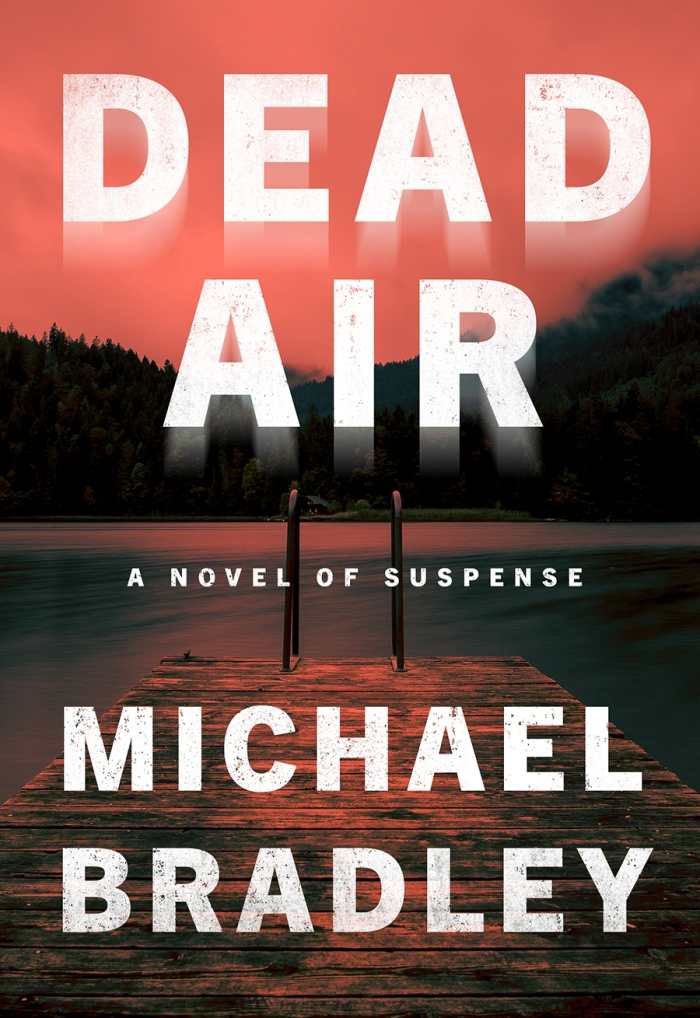
Michael Bradley
CamCat Books
Softcover $14.99 (278pp)
978-0-7443-0001-7
Buy: Local Bookstore (Bookshop), Amazon
In Michael Bradley’s captivating thriller Dead Air, a radio DJ’s spotty past catches up to her in cruel and violent ways.
Kaitlyn thought her life was on track. She has a successful career and a loving fiancé, though she keeps her friends at arm’s length; most know little to nothing about her younger years. Her peace is shattered when anonymous letters appear at her office, making references to The Shallows, where Kaitlyn’s childhood innocence was lost.
Kaitlyn intends to keep The Shallows a buried secret, even as the letters’ author becomes more aggressive. A detective, Rodney, and his partner, Julia, know that Kaitlyn is not telling them everything, and Rodney is affected by Kaitlyn’s resemblance to his estranged daughter. As Kaitlyn’s curated world falls apart, she confronts the detectives, her stalker, and the truth about The Shallows to avoid further damage.
Kaitlyn’s puzzling past is revealed through gradual flashbacks that blur her role: she seems to be both a victim and potential perpetrator. Kaitlyn’s preferred coping method is escapism: she ran after the incident at The Shallows, and continues to run from reality, lying to her fiancé, friends, and police.
Kaitlyn, Rodney, and the stalker have something essential in common: they harbor intense guilt about their pasts, which manifests in irresponsible and dangerous ways. The narration switches between their perspectives, resulting in an intimate, even empathetic experience of the stalker’s mindset that drops clues about their identity. An uncomfortable correlation between mental illness and violence is introduced near the book’s end, whose resolution otherwise stays true to the characters.
Dead Air is an exciting mystery whose flawed leads struggle to make the right decisions.
DELIA STANLEY (June 18, 2020)
Danielle Ballantyne

